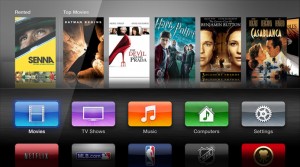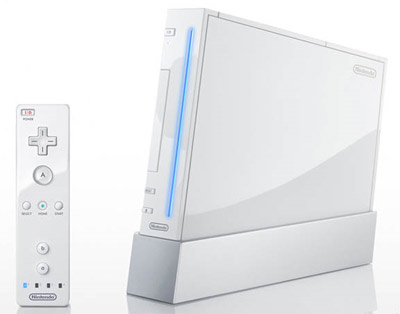 Apple TV is one of the things I get asked quite a bit about during my industry analysis presentations. It seems that everyone out there wants to know what Apple has planned for the big screen. Although no one knows, and there is much speculation, my key thoughts about this all along have been that Apple will in some way turn the TV screen into a platform to deliver rich content and services. If you think about it, the TV screen is the last of major screens in consumers lives to truly become a smart. Many vendors have tried, but the technology in many ways is still not here to really make TV’s smart.
Apple TV is one of the things I get asked quite a bit about during my industry analysis presentations. It seems that everyone out there wants to know what Apple has planned for the big screen. Although no one knows, and there is much speculation, my key thoughts about this all along have been that Apple will in some way turn the TV screen into a platform to deliver rich content and services. If you think about it, the TV screen is the last of major screens in consumers lives to truly become a smart. Many vendors have tried, but the technology in many ways is still not here to really make TV’s smart.
I believe there is a tremendous amount of interest in Apple’s moves in this area because of the massive opportunity to re-invent what we experience through our TV. But the opportunity is much larger than simply consuming video content in new ways.
A Platform Unlike Any Other
The untapped opportunity for the large piece of dumb glass sitting in hundreds of millions of consumers living rooms and bedrooms is to create the ultimate entertainment platform. This is a big deal if you think about it. Today most platforms are computing platforms where things like entertainment are secondary to things like productivity, communication, etc. This is what has always intrigued me about game consoles. I have felt from very early on in my digital home research that game consoles were the ultimate entertainment platforms which would evolve into trojan horse entertainment gateways for more than just video gaming. With many of the updates brought to both the Playstation and the XBOX, it is clear that this is exactly what is happening. In fact, I believe that the value of game consoles for today’s and perhaps even future consumers, will be less about gaming and more about other entertainment services.
That being said, gaming is an important part of living room entertainment. That is why I believe Apple is betting seriously on gaming across all of the screens in which they compete. Game Center for Apple becomes the glue tying consumer gaming experiences together and the foundation of a gaming service akin to XBOX Live. A holistic video game strategy both immersive and casual is key to the future of Apple TV as an entertainment platform.
A Set Top Box is a Trojan Horse not a Large Piece of Glass
I will believe that Apple is making a large piece of glass when I see it. In my opinion the current strategy with Apple TV is that it is a small, yet powerful, set top box and is their best plan of action. Mainly because there is absolutely nothing that can be built into a large piece of glass that can not also be accomplished with a small, yet powerful, set top box. If Apple wants to sell hundreds of millions of Apple TV’s it will accomplish this with a set top box not a large, and expensive, piece of glass. Even if Apple does decide to sell a large piece of glass in the shape of a TV, they would still have to employ the Apple TV set top box strategy in order to provide an identical experience to the hundreds of millions of consumers who already have large pieces of glass and don’t intend on buying a new one any time soon.
Interestingly, Microsoft is in a position to compete when it comes to entertainment platforms. The XBOX 360 is much more than a gaming console and is evolving into a fairly mature entertainment gateway. The XBOX 360 has been called a trojan horse before and I believe it is but Microsoft can not sit still.
We may analyze and probe from every angle Apple TV in its current implementation and yet I don’t believe Apple or Microsoft has yet implemented the key growth features for this category–namely apps. The next frontier of the TV platform is to let developers begin to invent new applications and software designed specifically for the large screen. This does not mean a repurposing of existing apps and blowing them up to fit on a larger screen. It means re-inventing the way we think about software and entertainment experiences for the big screen Similarly, touch computing required a new software development paradigm built from the ground up to work with touch; so I believe the TV needs software purposely built for that screen and its role in consumers lives.
What makes the TV fascinating is how different of a relationship consumers have with it versus other screens, or platforms, in their lives. For example, the TV is not a personal screen like a notebook, tablet, or smartphone. The TV is a communal screen where in a family environment it is enjoyed by multiple people simultaneously. In this scenario it doesn’t make a ton of sense for me to run Twitter or Facebook, or at the very least those aren’t the most interesting applications for the TV. What gets me excited is that when the TV becomes a platform for software developers to take advantage of, I believe we will see an entirely new set of applications developed with more communal experiences in mind.
The family or communal cloud will become an important ingredient in this scenario. I wrote about the need for more family and communal clouds last week and the more I think about it the more I am convinced it is an unmet need in the market. Communal screens will require communal content and that is when the family’s digital media becomes an important part of the experience. The experience of seeing up to date photos of loved ones and family members (of my choosing) on my TV is one I feel would be of great value.
Lastly, I would add that although I believe Apple TV is a trojan horse, I am not convinced Apple has yet employed the strategy fully. I think this is where gaming and apps will come in to round out the platform. I know we want to kick our cable providers to the curb but I don’t think that is the entry point. I believe games and apps will deliver the value propositions that get the Apple TV trojan horse strategy going. Then once in the door in masses, hopefully the Hollywood industry will begin to invest in business models that will keep them from extinction in the future.

